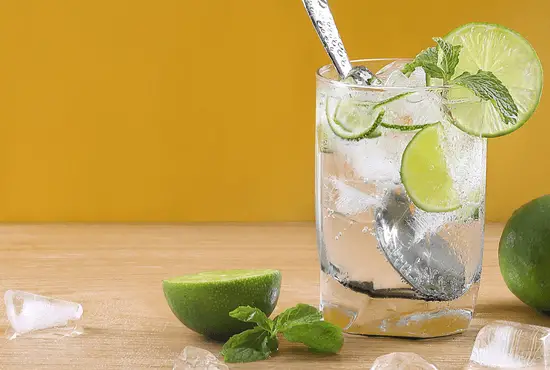Why don’t you juice lemon peels the same way you do the fruit’s flesh? I get it! Not many people like the idea of utilizing peels and instead throw them away. But, what if I tell you that lemon peel contains numerous health benefits, even more than the fruit itself?
Moreover, the juice doesn’t taste as bad as you think. So, let’s get into more detail about why you should juice lemon peel.
Juicing lemon peel is safe and provides you with additional nutrients. Make sure to use organic lemons as they are pesticide-free, or you can also use non-organic ones but wash them well. The bitter taste of lemon peel can go away if you add sweetening agents or other fruits to the juice.
It is not exaggerating to say that lemons are power-packed due to the high amount of vitamin C. The same is also true for their peel that we often ignore. This detailed article will inform you about all the pros and cons of juicing lemon peel and some recipes to try.
Table of Contents
Is It Safe To Juice Lemon Peel; Why Or Why Not?
Juicing lemons is something we all did at some point in our lives. Especially during hot summer days, a glass of fresh lemonade is a well-known thirst quencher. But what about the left-over lemon peels? I am sure throwing them away seems like the obvious task to do.
However, lemon peels are full of potential, and you can utilize them in so many different ways, even juice them. Yes, you read it right! As much as the flesh of this citrus fruit is rich in nutrition, the skin is even better for health. Contrary to the popular misbelief, lemon peel is not toxic and, in fact, completely safe and edible.
Additionally, Juicing lemon peel provides a lot of advantages, such as:
Creates less mess
Nobody enjoys the tedious job of peeling fruits before juicing them, not to forget the mess created. Thus, when you decide to leave the lemon peel intact, it makes the whole process much fast, easy, and a lot less messy. What a sigh of relief! Isn’t it?
Increases nutrient value
Now, let’s talk about the main benefit of not peeling the lemons for juicing. Most of the nutrients of citrus fruits are present in the skin, including vitamin C, flavonoids, antioxidants, antibacterial compounds, and many more. So, when you juice the lemon peel, it boosts the overall nutrient value of the juice, which in turn is super beneficial for your health.
Gives a pulpy yield
If you are a fan of juices with a pulpy consistency, you can try to juice the lemon skin. This way, you will not just get a rich texture but also a natural and fresh citrusy taste.
Juicing Organic VS Non-Organic Lemon Peel
No doubt, juicing lemon peel has many advantages. But, it also has certain risk factors. The most common issue that you can face is safety concerns. The non-organic lemon variety, readily available in the market, is often not the safest juicing choice.
It is because they grow in such an environment, which is prone to different chemicals and pesticides. All these toxic elements build up on the fruit’s skin, and when you consume them along with the skin, they may cause harm to your health. However, you can easily prevent this by giving a thorough wash to the lemons to remove the toxins.
Another great option is to go for organically produced lemons. They do not get any chemical treatments, so their skins are perfectly safe for juicing. But, it is a little hard to find an organic variety of fruits, so you will need to search for them.
Does Lemon Peel Change The Taste Of Juice?
Like most other edible peels, the lemon skin also tastes somewhat bitter. So, you can expect the same bitterness in your juice when you leave the skin unpeeled. If you do not mind a strong-zesty flavor, you juice the lemon peel and benefit from its medicinal properties. Or, you can also add sweetening agents or fruits of your choice to make the final drink more palatable.
I suggest limiting the number of lemon peels so that you do not have to think twice before sipping the juice.
What Type Of Juicer Is Best For Juicing Lemon Peel?
As you already know, the peel of lemon, like most citrus fruits, is tough to juice. You have to be careful when juicing them because not all types of juicers are powerful enough to handle them. If you unknowingly put them in your juicer, there are high chances your machine will suffer damage or other issues.
The best choice for juicing lemon peel is masticating or slow juicers. Though they are costly, they are sturdy and handle any ingredient you throw inside them. Moreover, masticating juicers also reserve most nutrients without wasting them, so they should be the go-to juice extractors for any peels.
Can You Juice Frozen Lemon Peel?
Absolutely! Frozen lemons are a great addition to not only juices but also smoothies. As long as you freeze lemons in proper packaging, you can take them out, thaw them and then do whatever you want with them. One benefit of juicing defrosted lemons is that they turn mushy afterward, which means you can get more juice yield.
Based on your juicer, you can either put the whole frozen lemon inside the chute or slice them first. Similarly, you can also blend it along with other ingredients to create a deliciously creamy smoothie. However, inspect the citrus fruit for any sign of discoloration or off smell before you juice them.
How To Easily Juice Lemon Peel At Home; Tips And Tricks
We’ve compiled a step-by-step guide for you that you can follow to create a refreshing lemon peel beverage. Let’s get into it!
Firstly, wash your lemons thoroughly, especially the non-organic variety of fruit. It will help in removing the lingering chemicals on the surface and dirt that can end up in your juice.
Once you clean them, slice the lemon into even pieces to fit inside the juicer chute. You can skip this step if your juicer can handle whole fruit and if needed, consult the machine manual for confirmation.
Also, remove the seeds as they might clog or jam the juicer.
Next, run the lemons through the machine until all the citrusy liquid gets squeezed out of the fruit.
At this stage, you can add other ingredients of your choice to balance the bitter flavor of lemon peels.
Another method of extracting juice from lemon peels is throwing the skins into a pot of boiling water.
Let them boil for a few minutes, and meanwhile, you can add sugar to taste or maybe some ginger or mint for enhanced flavor.
Now, strain the juice, let it cool down, and then transfer it to the refrigerator for chilling. That’s it! Enjoy with friends and family later.
Try These Amazing Zesty Lemon Juice Recipes
A. Whole lemon lemonade
Ingredients
- Two to three lemons (unpeeled)
- A cup of water (or as needed)
- Agave/ honey (for sweetening)
- Fresh ginger juice (optional)
- Mint leaves (optional)
- Berries (optional)
Procedure
- Slice the whole lemons into about eight pieces, and discard the seeds.
- Toss the pieces inside a blender while adding some water and sweetening agent of your liking.
- Blend the ingredients on high for about a minute or two until you get a frothy and creamy texture liquid.
- You can jazz up the lemonade by adding some ginger juice, mint, or berries, as you prefer.
- It is the easiest and quickest way to make a refreshing lemonade whenever you crave it. Enjoy!
B. Lemon, apple, and ginger drink
Ingredients
- Four apples (sliced and unpeeled)
- One lemon (unpeeled)
- A ginger chunk (peeled)
Procedure
- Wash the ingredients properly, then chop the fruits into a reasonable size, depending on your food processor/ juicer model.
- Remove the seeds from the lemon and then put everything inside the juice extractor one after another.
- If you do not prefer lemon peel, squeeze the lemon juice manually over the mixture.
- This drink is perfect to start your day with and will give an instant energy boost alongside added anti-inflammatory properties.
Is Juicing Lemon Peel Good For Health?
Lemon peels contain tons of essential vitamins, minerals, and fibers that give you a nutritional boost. Consuming a large number of citrus peels in the form of juice means you get:
- Vitamin C; which acts as a powerful antioxidant, protecting the DNA from the damage caused by free radicals. It also prevents a condition called scurvy that occurs due to the deficiency of vitamin C in the body.
- Calcium; is a vital mineral that helps in protecting against bone fractures and osteoporosis. Furthermore, it lowers the risk of colorectal cancer, improves hormone secretion, and normalizes muscle contraction.
- Potassium; plays a central role in maintaining heart function, regulates digestion, and reduces the risks of high blood pressure and stroke.
- Fiber; lemon peel juice is highly fibrous, which checks and balances bowel movements, assists in weight loss, plus maintains blood sugar levels. In addition, it may also prevent chronic conditions, including type 2 diabetes and cardiovascular diseases.


